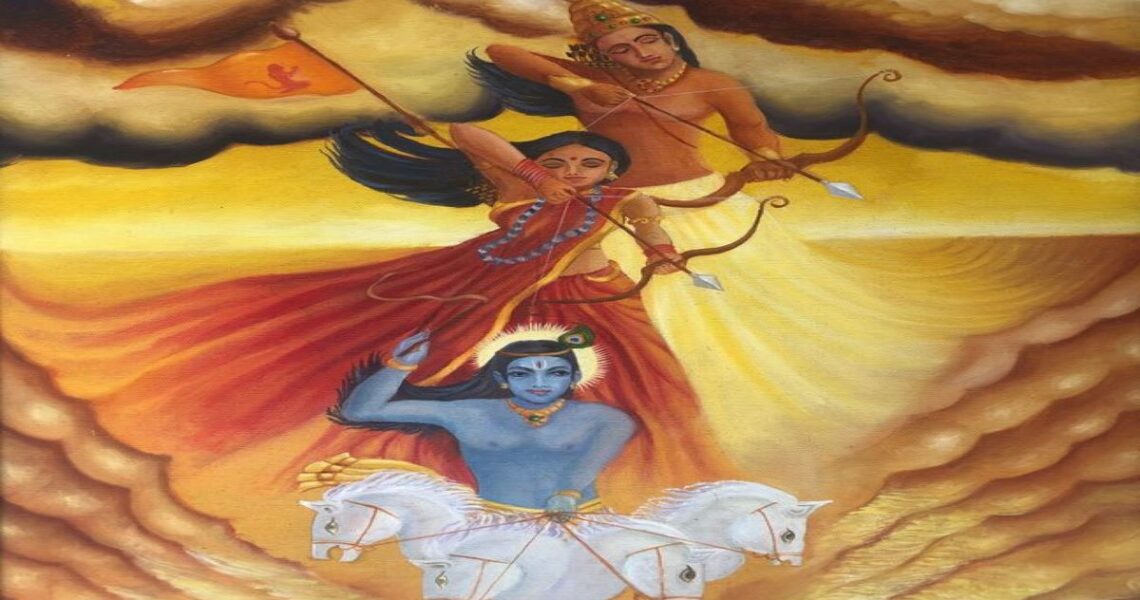The unknown tale of Shikhandi:
The ninth day of Mahabharata war
It was the ninth night of the Kurukshetra war, the midpoint of the legendary war. The war was not really going anywhere, sometimes Bhishma, leading the Kauravas had the upper hand; sometimes the Pandavas led by the young Dhristadhyumna was looking powerful. It seemed that an end was no where to be seen.
Defeating Bhishma
Even though Bhishma adored Pandavas, he fought the war for the Kauravas. Hence, it was important for him to die to establish Dharma, said Krishna. However, he had been given a boon by his father that he could choose the time of his own death. Krishna suggested that if he can’t die, he must be rendered helpless.
Woman on battlefield
It is said that Bhishma was invincible as long as he had a weapon in his hands. Krishna suggested that we should attempt to get him to lower his weapon. Bhishma would never lower his weapons in front of man, said the Pandavas. Krishna then thought of a masterplan, that of getting a woman on the battlefield.
Shikhandi: The chosen one
Dhristadhyumna, Draupadi’s twin brother suggested the name of his brother/sister Shikandini to fight the war. The latter was born a woman, but changed her sex and just like a man, was trained in warfare. She had also received a boon from Lord Shiva in her previous birth that only she will be able to defeat Bhishma (as she was Amba then whom Bhishma had wronged).
Woman on battlefield
“I think, Shikhandi should ride into the battlefield on my chariot. Let Arjuna stand behind him,” said Krishna. The tenth day dawned. The chariot rolled out. Behind Krishna stood the strange creature, neither man nor woman, or perhaps both, or neither, and behind him, Arjuna. Bhishma was furious to see a woman in a battlefield and refused to fight the war.
Shikhandi avenges Amba’s insult
Krishna calmly explains to Bhishma that the latter sees her as a woman, since he sees Amba in her who was a woman. However, her father raised her as a man and she exchanged her sex with Yaksha in the forest, so she is as much as a man as anyone fighting the war. So, whose point of view was actually correct?
Woman on battlefield
However, Bhishma refused to fight Shikandi. He lowered his bow and that’s when Krishna asked Shikandi to shoot him. Shoot him with a thousand bows so that he can be immobilized and can no longer actively take part in the warm says Krishna (since he could only die when he wanted to).
Bhishma’s end
Shikandi did just that and Bhishma fell to the ground. Post that, Krishna asked Arjuna to shoot more. The latter hesitated since Bhishma was like his father but Krishna explained to him that one must pave way for a new world — adharma must be replaced by dharma and Bhishma needs to pass on if a new generation has to take over.
Why Bhishma remained mid-air
Hundreds of arrows punctured every limb of Bhisma’s body, his hands, his legs, his trunk, his thighs, till he fell like a giant Banyan tree in the middle of a forest. However, it is said that the earth refused to accept him since he had not fathered children and repayed his debt to his ancestors, so Bhishma remained suspended mid-air on a bed of arrows.
Woman on battlefield
With the fall of Bhishma, the war swinged in favour of the Pandavas – nine days later, Kauravas were defeated and the Pandavas won the legendary battle. In a way, Shikandi was responsible for winning this war for the Pandavas or as Krishna says, she helped dharma get reestablished in the society.
Shikhandi was important
As much as Shikandi was important to the war, her tale is often ignored in the retelling of the Mahabharata, since her sex is often looked down upon on the society. Yet, Shikandi was as human as anyone in the war and her sex had no consequence to what she achieved in the war.
Embodies LGBT community
Shikhandi represents all queer people – from gays to lesbians to Hijras to transgender people to hermaphrodites to bisexuals. However, the fact that Shikandi helped win the war in the interim period of the 9th and the 10th day shows that as a character Shikandi was neither here nor there. She was neither a man or woman, yet she was responsible for bringing the Kauravas down.
Woman on battlefield
Even though some people might have looked down upon Shikandi, her sex rarely came in between her relationships. She was well accepted by everyone and went on to win the war for the Kauravas. This goes on to show that it does not matter whether you are man, woman or in between, your karma is what will get you ahead in life.
Celebrating the third gender
Shikandi represents the third gender and while it might have taken India decades to even notice the LGBTQ community, our scriptures were quite comfortable with the latter — At the end of the day, Shikandi was a human being who was extremely critical in winning the war — she was and will always remain a key element in Mahabharata.
